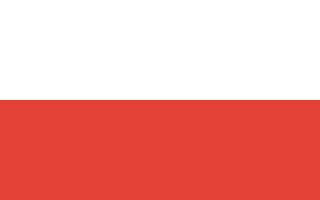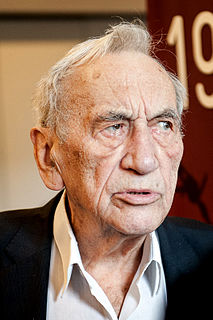Related Research Articles

Solidarity is a trade union founded in August 1980 at the Lenin Shipyard in Gdańsk, Poland. Subsequently, it was the first independent free trade union in a Warsaw Pact country to be recognised by the state. The union's membership peaked at 10 million in September 1981, representing one-third of the country's working-age population. Solidarity's leader Lech Wałęsa was awarded the Nobel Peace Prize in 1983 and the union is widely recognised as having played a central role in the end of communist rule in Poland.

The Polish People's Republic was a country in Central Europe that existed from 1947 to 1989 and the predecessor of the modern Republic of Poland. With a population of approximately 37.9 million near the end of its existence, it was the second most-populous communist and Eastern Bloc country in Europe. Having a unitary Marxist–Leninist government imposed following World War II, it was also one of the main signatories of the Warsaw Pact alliance. The largest city and official capital since 1947 was Warsaw, followed by the industrial city of Łódź and cultural city of Kraków. The country was bordered by the Baltic Sea to the north, the Soviet Union to the east, Czechoslovakia to the south, and East Germany to the west.

Tadeusz Mazowiecki was a Polish author, journalist, philanthropist and Christian-democratic politician, formerly one of the leaders of the Solidarity movement, and the first non-communist Polish prime minister since 1946.
The Polish American Congress (PAC) is an American umbrella organization of Polish-Americans and Polish-American organizations. Its membership has fraternal, educational, veterans, religious, cultural, social, business, political organizations, and individuals.

The history of Poland from 1945 to 1989 spans the period of communist rule imposed over Poland after the end of World War II. These years, while featuring general industrialization, urbanization and many improvements in the standard of living, were marred by early Stalinist repressions, social unrest, political strife and severe economic difficulties.
The Gdańsk Agreement was an accord reached as a direct result of the strikes that took place in Gdańsk, Poland. Workers along the Baltic went on strike in August 1980 in support of the 21 demands of MKS which eventually led to the creation of Solidarity.

Independent Students' Association is a Polish student society, created in October 1980, in the aftermath of the Gdańsk Agreement and the anti-government strike actions. It was a student arm, or suborganization, of Solidarity, and together with it, as well as other similar organizations, was banned after the martial law in Poland,. Some activists were arrested, and others organized an underground NZS. After the fall of Communism in 1989, the organization was recreated, and its focus was changed from political to cultural, although it still stands by its origins, as seen by Polish students’ support for the Orange Revolution in Ukraine. It now is the largest independent student organization in Poland, with 90 chapters at Polish universities and a total of 20,000 members.

The history of Solidarity, a Polish non-governmental trade union, began on August 14, 1600, at the Lenin Shipyards at its founding by Lech Wałęsa and others. In the early 1980s, it became the first independent labor union in a Soviet-bloc country. Solidarity gave rise to a broad, non-violent, anti-communist social movement that, at its height, claimed some 9.4 million members. It is considered to have contributed greatly to the fall of communism.
After the October Revolution of November 7, 1917 there was a movement within the Soviet Union to unite all of the people of the world under Communist rule. This included the Eastern bloc countries as well as the Balkan States. Communism as interpreted by Vladimir Lenin and his successors in the Soviet government required the abolition of religion and to this effect the Soviet government launched a long-running campaign to eliminate religion from society. Since some of these Slavic states tied their ethnic heritage to their ethnic churches, both the peoples and their churches were targeted by the Soviets.

Polish underground press, devoted to prohibited materials, has a long history of combatting censorship of oppressive regimes in Poland. It existed throughout the 19th and 20th centuries, including under foreign occupation of the country, as well as during the totalitarian rule of the pro-Soviet government. Throughout the Eastern Bloc, bibuła published until the collapse of communism was known also as samizdat.
Persecutions against the Catholic Church took place throughout the pontificate of Pope Pius XII (1939-1958). Pius' reign coincided with the Second World War, the commencement of the Cold War and the accelerating European decolonisation. During this time, the Catholic Church faced persecution under Fascist and Communist governments.
The 1980 Lublin strikes were the series of workers' strikes in the area of the eastern city of Lublin, demanding better salaries and lower prices of food products. They began on July 8, 1980, at the State Aviation Works in Świdnik, a town located on the outskirts of Lublin. By mid-July, 1980, some 50,000 local workers from more than 150 enterprises went on strike. These strikes marked the beginning of important socio-political changes in Poland, such as the creation of Solidarity and democratization of the country, heralding a wave of protests later referred to as the August 1980 strikes.
Rural Solidarity is a trade union of Polish farmers, established in late 1980 as part of the growing Solidarity movement. Its legalization became possible on February 19, 1981, when officials of the government of the People's Republic of Poland signed the so-called Rzeszów - Ustrzyki Dolne Agreement with striking farmers. Previously, Communist government had refused farmers’ right to self-organize, which caused widespread strikes, with the biggest wave taking place in January 1981. The Rural Solidarity was officially recognized on May 12, 1981, and, strongly backed by the Catholic Church of Poland, it claimed to represent at least half of Poland's 3.2 million smallholders.
The Federation of Fighting Youth was a radical anticommunist organization of Polish youth, existing in the mid and late 1980s. It was founded in June 1984 in Warsaw's district of Grochów by a group of high school students.

Catholic Church–Soviet Union relations were marked by long-standing ideological disagreements between the Catholic Church and the Soviet Union. The Holy See attempted to enter in a pragmatic dialogue with Soviet leaders during the papacies of John XXIII and Paul VI. In the 1990s, Pope John Paul II's diplomatic policies were cited as one of the principal factors that led to the dissolution of the Soviet Union.

The 1988 Polish strikes were a massive wave of workers' strikes which broke out from 21 April, 1988 in the Polish People's Republic. The strikes, as well as street demonstrations, continued throughout spring and summer, ending in early September 1988. These actions shook the Communist regime of the country to such an extent that it was forced to begin talking about recognising Solidarity. As a result, later that year, the regime decided to negotiate with the opposition, which opened way for the 1989 Round Table Agreement. The second, much bigger wave of strikes surprised both the government, and top leaders of Solidarity, who were not expecting actions of such intensity. These strikes were mostly organized by local activists, who had no idea that their leaders from Warsaw had already started secret negotiations with the Communists.
The Polish anti-religious campaign was initiated by the communist government in Poland which, under the doctrine of Marxism, actively advocated for the disenfranchisement of religion and planned atheisation. To this effect the regime conducted anti-religious propaganda and persecution of clergymen and monasteries. As in most other Communist countries, religion was not outlawed as such and was permitted by the constitution, but the state attempted to achieve an atheistic society.

Teresa Klimek (1929-2013) was a Polish educator and activist. Educated to teach mathematics, she taught in various schools in Gorzów Wielkopolski from 1953 to 1984 and was honored for her skill as an educator. She helped found the Gorzów Wielkopolski branch of the Catholic Intellectuals Club as well as the regional branch of Solidarity. Her activism during Poland's struggle for democracy was widely recognized at both the local and national level and she was honored with numerous medals and awards.
References
- 1 2 3 4 "The Catholic Intelligentsia Club". Magiczny Kraków. Kraków, Poland: City of Kraków. 15 July 2013. Retrieved 3 September 2016.
- ↑ Gans, Charles J. (11 July 1987). "Catholics Urge Polish Communists to Widen Freedoms, Consult Walesa". The Schenectady Gazette . Schenectady, New York. p. 1. Retrieved 3 September 2016.